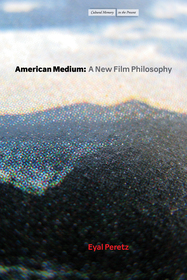
American Medium – A New Film Philosophy
A New Film Philosophy
Sorozatcím: Cultural Memory in the Present;
-
10% KEDVEZMÉNY?
- A kedvezmény csak az 'Értesítés a kedvenc témákról' hírlevelünk címzettjeinek rendeléseire érvényes.
- Kiadói listaár GBP 20.99
-
10 027 Ft (9 550 Ft + 5% áfa)
Az ár azért becsült, mert a rendelés pillanatában nem lehet pontosan tudni, hogy a beérkezéskor milyen lesz a forint árfolyama az adott termék eredeti devizájához képest. Ha a forint romlana, kissé többet, ha javulna, kissé kevesebbet kell majd fizetnie.
- Kedvezmény(ek) 10% (cc. 1 003 Ft off)
- Kedvezményes ár 9 025 Ft (8 595 Ft + 5% áfa)
Iratkozzon fel most és részesüljön kedvezőbb árainkból!
Feliratkozom
10 027 Ft

Beszerezhetőség
Még nem jelent meg, de rendelhető. A megjelenéstől számított néhány héten belül megérkezik.
Why don't you give exact delivery time?
A beszerzés időigényét az eddigi tapasztalatokra alapozva adjuk meg. Azért becsült, mert a terméket külföldről hozzuk be, így a kiadó kiszolgálásának pillanatnyi gyorsaságától is függ. A megadottnál gyorsabb és lassabb szállítás is elképzelhető, de mindent megteszünk, hogy Ön a lehető leghamarabb jusson hozzá a termékhez.
A termék adatai:
- Kiadás sorszáma 1
- Kiadó MK – Stanford University Press
- Megjelenés dátuma 2025. november 18.
- ISBN 9781503644984
- Kötéstípus Puhakötés
- Terjedelem248 oldal
- Méret 229x152x13 mm
- Súly 354 g
- Nyelv angol
- Illusztrációk 10 halftones 700
Kategóriák
Hosszú leírás:
"
In this masterful new work, film critic and philosopher Eyal Peretz forges a new connection between the concept of ""America"" and the medium of film. Through exemplary close readings of six fundamental American films—John Ford's Young Mr. Lincoln and The Man Who Shot Liberty Valance, Francis Ford Coppola's The Godfather, Steven Spielberg's West Side Story, and Sofia Coppola's Lost in Translation and Marie Antoinette—Peretz demonstrates the way the connection between ""America"" and film is enabled through the development of a philosophical concept of medium that allows both ""America"" and film to be thought anew.
As Peretz shows, ""America"" can be understood as a medium providing a new framework for understanding human life in modernity—an era that's seen the demise of theology (or the ""death of god,"" as Nietzsche declared). Through incisive readings of the films mentioned above, Peretz shows each to function in its own singular fashion as an allegory of the way that ""America""—that is, the demand to ground human life non-theologically—becomes the notion around which the medium of Hollywood film circulates.
" Több



